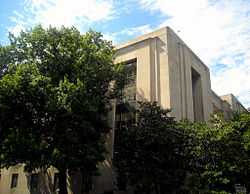Wilbur J. Cohen
| Wilbur J. Cohen | |
|---|---|
 | |
| 7th United States Secretary of Health, Education, and Welfare | |
| In office May 16, 1968 – January 20, 1969 | |
| President | Lyndon B. Johnson |
| Preceded by | John W. Gardner |
| Succeeded by | Robert H. Finch |
| Personal details | |
| Born | Wilbur Joseph Cohen June 10, 1913 Milwaukee, Wisconsin, United States |
| Died | May 17, 1987 (aged 73) Seoul, South Korea |
| Resting place | Garden of Memories Cemetery Kerrville, Texas, United States |
| Political party | Democratic |
| Spouse(s) | Eloise Bittel Cohen (m. 1938 - 1987, his death) |
| Children | Christopher Bruce Stuart |
| Alma mater | University of Wisconsin–Madison |
| Profession | Government |
| Religion | Jewish |
Wilbur Joseph Cohen (June 10, 1913 – May 17, 1987) was an American social scientist and federal civil servant. He was one of the key architects in the creation and expansion of the American welfare state and was involved in the creation of both the New Deal and Great Society programs.
Early life and career
Cohen was born in Milwaukee, Wisconsin, to Bessie (née Rubenstein) and Aaron Cohen. He was known to by several nicknames. He was once dubbed "The Man Who Built Medicare" and John F. Kennedy tagged him "Mr. Social Security", although it was Frances Perkins, the first woman Secretary of Labor (under FDR), who was the architect of social security. The New York Times called him "one of the country's foremost technicians in public welfare." Time portrayed him as a man of "boundless energy, infectious enthusiasm, and a drive for action." He was a leading expert on Social Security and a member of Americans for Democratic Action.
After graduating from the University of Wisconsin–Madison in 1934, Cohen moved to Washington, D.C. where he was a research assistant for the committee which drafted the Social Security Act.
On April 8, 1938, Cohen married Eloise Bittel. They had three sons: Christopher, Bruce and Stuart.[1]
He was Director of the Bureau of Research and Statistics in charge of program development and legislative coordination with Congress for the Social Security Board (SSB), which was renamed the Social Security Administration in 1946.
Kennedy and Johnson administrations
In 1961, President John F. Kennedy appointed Cohen Assistant Secretary for Legislation of Health, Education, and Welfare.
President Lyndon B. Johnson elevated him to Under Secretary in 1965, and he served as the U.S. Secretary of Health, Education, and Welfare in 1968, following the resignation of John W. Gardner.
He joined several others in filing suit against Wilbur Cohen, the Secretary of Health, Education, and Welfare, contending that spending funds on religious schools violated the First Amendment's ban on the establishment of religion. The district court denied standing, and the Supreme Court heard the appeal.
Later life and death
In 1969, Cohen retired at the end of a Johnson's administration. In 1970, Cohen served as the president of the American Public Welfare Association (renamed the American Public Human Services Association in 1997). In 1980 Cohen became a Professor of Public Affairs at the University of Texas at Austin.[2]
The University of Michigan in Ann Arbor, where Cohen was a professor of Public Welfare Administration and lived for many years, established the Wilbur J. Cohen Collegiate Professor of Social Work professorship in his honor.
He died while attending a gerontology conference in Seoul, South Korea, on May 17, 1987. He is interred at Garden of the Memories Cemetery in Kerrville, Texas.
-

Cohen in the early days of Social Security with Maurine Mulliner, who was the Executive Secretary of the Social Security Board in 1935.
-

Wilbur J. Cohen being sworn in as the Secretary of Health, Education and Welfare; from left to right: President Lyndon B. Johnson (far right), Vice-President Hubert H. Humphrey (far left), and the Eloise B. Cohen (right) and the three sons in 1968.
-

The Former residents of Wilbur J. Cohen in Washington, D.C.
Books
- The Elimination of Poverty in the United States. Wilbur J. Cohen, 1963.
- The Roosevelt New Deal: A Program Assessment Fifty Years After. Wilbur J. Cohen. Austin, Texas: University of Texas Press. 1986 paperback edition: ISBN 0-89940-416-2, ISBN 978-0-89940-416-5.
- Social Security: Universal or Selective? Wilbur J. Cohen and Milton Friedman, co-authors. Washington: American Enterprise Institute for Public Policy Research. 1972.
- Unemployment Insurance in the United States: The First Half Century. Saul J. Blaustein, Wilbur J. Cohen, William Haber, co-authors. Kalamazoo, Michigan: W. E. Upjohn Institute for Employment Research. 1993 hardcover edition: ISBN 0-88099-136-4, ISBN 978-0-88099-136-0.
- Biography
- Wilbur J. Cohen: the pursuit of power; a bureaucratic biography. Marjorie O'Connell Shearon. Shearon Legislative Service. 1967.
- Mr. Social Security: The Life of Wilbur J. Cohen. Edward D. Berkowitz.[3] Lawrence, Kansas: University Press of Kansas. 1995 hardcover edition: ISBN 0-7006-0707-2, ISBN 978-0-7006-0707-5.
References
- ↑ Fitzhugh Mullan (5 October 1988). "Interview with Dr. Philip Randolph Lee". History of Health Services Research Project, National Institutes of Health.
- ↑ Saxon, W. Wilbur Cohen, Leading Architect Of Social Legislation, Dies at 73. New York Times May 19, 1987. p. D30.
- ↑ Edward D. Berkowitz. Foreword by Joseph A. Califano (1995). "Mr. Social Security: The Life of Wilbur J. Cohen". University Press of Kansas.
- Social Security Administration profile
- Guide To Social Security Archives, Papers of Wilbur Cohen
- Kansas Press book on him
- Site on LBJ's cabinet
- Literacy Connections list of publications by Wilbur J. Cohen
External links
| Political offices | ||
|---|---|---|
| Preceded by John W. Gardner |
United States Secretary of Health, Education, and Welfare May 16, 1968 - January 20, 1969 |
Succeeded by Robert H. Finch |
| ||||||||||||
|
